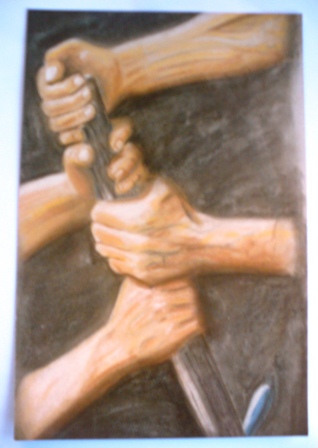A hospital bed offers a unique vantage point for observing today's real world and fake world and to mull our national healthcare dilemma. On the latter:
Do we:
- Grant the right to access healthcare even though you won't be able to afford what’s available (as at Tiffany Jewelers where nobody stops window shoppers from looking)?
OR - Grant the right to have healthcare (as in being a consumer of Medicare/Medicaid or ACA, complete with subsidies and costs spread across society, even among members who prefer Emergency Room visits over paying for their own coverage?
Being in the second category - and recently downed by an odd infection out of the blue - I got entry to the ER and a bed. It’s a bed that takes on a life of its own, swelling its mattress in rolling waves to minimize the undesirable effects of bedrest. In addition, I got an x-ray; scan; blood tests; two IV antibiotics hanging from a rolling pole; beeping monitors; and doctors and nurses staring intently at me and my vitals, keying data on computer screens.
Add to that three squares a day plus a bulky TV remote to wield and all the hours of courtroom drama a body can take: Court TV, with sagas of judicious reasoning butting up against wrong-headedness, error and folly.
As the IV drips and hours pass, a parade of health care workers enters my life. I watch one trim housekeeper swab the hospital room floor, poised and smiling, and I think, “It may not be the job she wants; but she performs it like any pro applying herself to a task."
Next is an amiable aide who delivers lunch. He comments about my iPad mini. We talk technology and medical advances and wind our way onto how to pay for uncovered conditions and ills. How to pay, indeed.
Throughout the evening, I watch a willowy nurse breeze in and out of the room. With 32 beds full, she is as competent and caring as any gold-standard nurse can be. A marvel, such people. Stretched by a full house, she still misses nothing on my must-have list. She isn’t alone.
The staff attending to my needs during the night is quiet and efficient. When asked, a few say they immigrated here - from Cambodia, Vietnam or the Philippines - and haven’t seen loved ones in years. There’s a pretty single mom who frets over her pre-adolescent son sulking at home. Another has two babies over whom I can gush as their faces light up her cellphone screen.
Early mornings, I chat with a nurse practitioner who juggles her duties and the needs of her three young children. She appears serene. A compassionate young MD appears (picture Kevin of “The Wonder Years,” grown up and practicing medicine.) He cheers as he makes his rounds, especially when he and specialists agree I’m on the other side of this mysterious bump in my road, ultimately diagnosed as a case of "Bad luck."
I depended on all these people. As I dress in street clothes for discharge, it occurs to me it’s no small feat their achieving job success - from hospital maintenance to required degrees. With the uphill climb some people face in our society, it is miraculous.
This was brought home in a PBS Independent Lens documentary (and Sundance award winner) called The Bad Kids in which at-risk youth overcame challenges and graduated in a nurturing environment. The school’s caring philosophy overrode the garbage life hurled at them from birth: parental mental illness, alcoholism, abandonment, drug addiction, sexual abuse, bullying and self-hate impulses to inflict wounds on their own bodies. Without role models but with prodding from committed school staff, teens inched toward training and earning a living and away from a courtroom podium or fame on Jerry Springer or Dr. Phil.
A wag once dismissively remarked we’re all here for someone else’s amusement. Today's TV courtroom audiences laugh. Snarky Internet comments - so superior, dismissive and cruel - suggest we're all a joke to someone. But, my country’s real people can't merely be a joke. Many struggle to get to the other side of bad luck, to flee the most threatening circumstance life's presented; if not physical ills they haven't the cash to correct, then their own dysfunctional habits or wrongheadedness. A lot of young people raised themselves and have yet to learn how to be part of a compassionate society.
It seems, whatever our station in life, with all due respect, we're better off viewing ourselves as in this life together (without exception) and we're better off pulling society's oar in the same direction.
by Reggie Morrisey
In honor of the late journalist Jimmy Breslin (October 217, 1930 - March 19, 2017), who always told the real story as he saw it.
